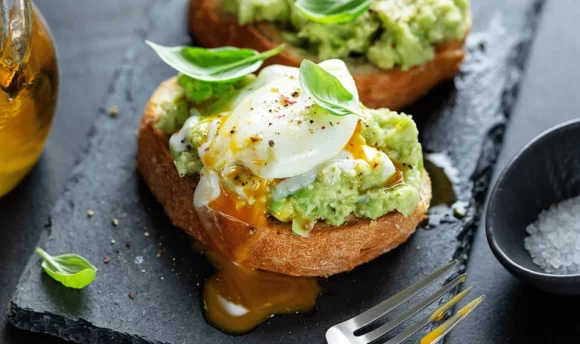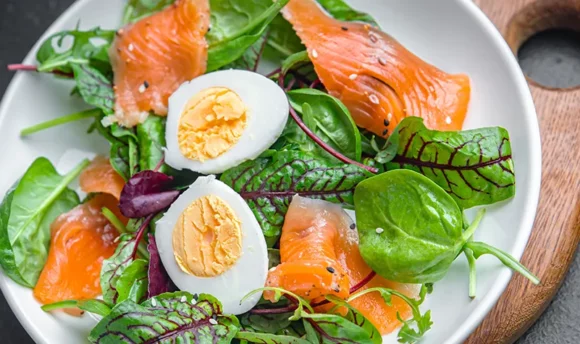Keto Meat List: The Ultimate Guide of Keto-Friendly Meats
The keto diet requires you to eat low-carb, high-fat foods, but what meat can you eat on this diet? We look at all the keto-friendly meats you can incorporate into your diet in this keto meat list.
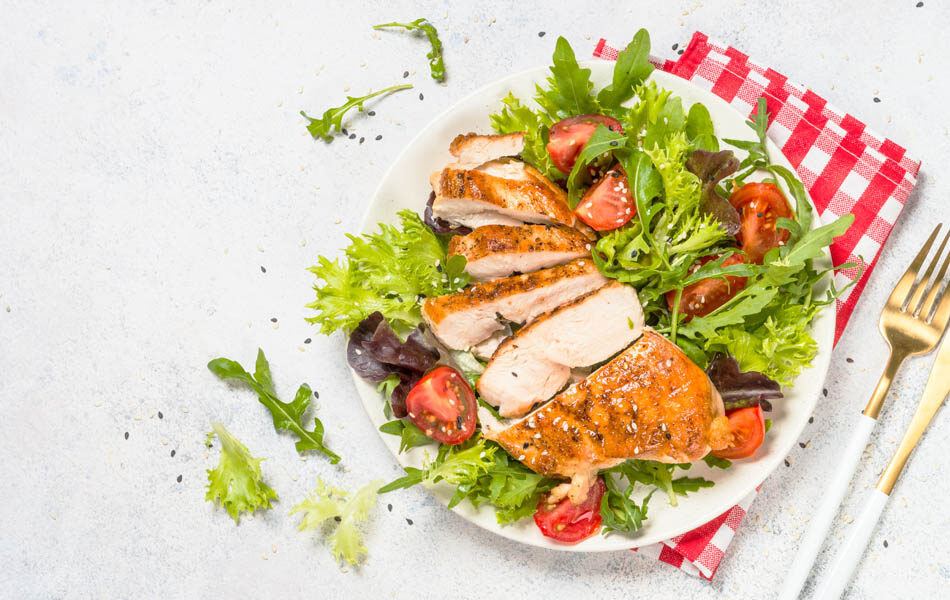
Eating the right food is the key to weight loss on the keto diet. Keto-friendly foods are usually high-fat and low-carb to keep your body in the metabolic state of ketosis. In this state, your body burns fat for fuel rather than blood sugar, helping you to reduce your overall weight.
Due to the strict nature of the keto diet, many foods that you would normally eat no longer fit into this low-carb diet. This means that foods like starchy vegetables, processed meats, and non-nutrient-dense foods are off the table as they won’t nourish you properly.
In this article, we’re going to look at all of the different meats that you can consume on the keto diet. Meat is a fantastic source of lean protein and fat, making it perfect for this type of diet. Take a look below to find out more.
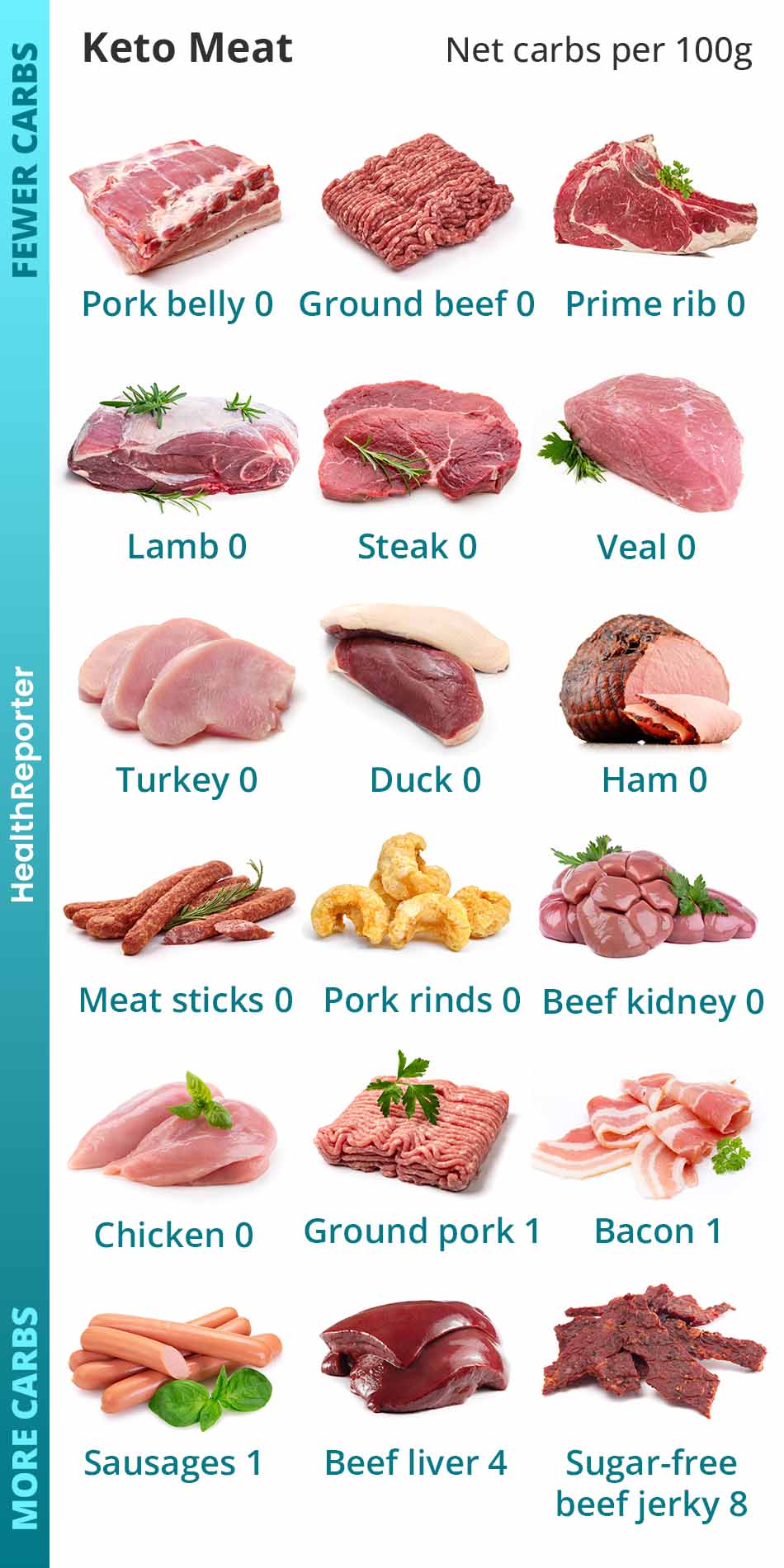
Extended Keto Meat List: The Ultimate Guide
In this guide, we’re going to take a look at all of the different meat types that you can and should consume when on the ketogenic diet. Our keto food list below will list the nutritional value of the meat, including net carbs, to help you pick the best keto meat for your meal.
See below to find out more about keto-friendly meats.
#1 All cuts of steak
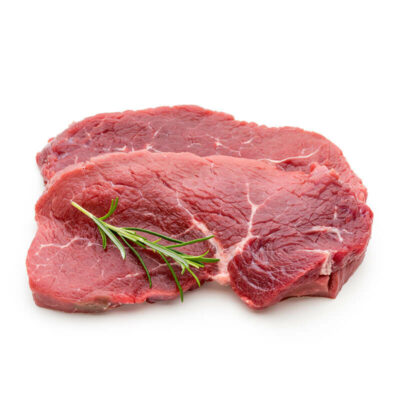
Steak is an excellent option for a keto-friendly meat product. The nutritional value of a porterhouse steak per 100g is as follows:
- Energy: 139kcal
- Protein: 22.7g
- Fats: 5.32g
- Carbs: 0g
With a high protein value, no carbs, and moderate fat content, you can keep your body in the state of ketosis for prolonged periods when you eat steak on the keto diet. It is important to watch out for additives in sauces that frequently come with steak and to look at the cooking method to ensure you’re not eating anything artificial.
#2 Beef
Beef is another high-protein, low-carb food choice that is perfect for the keto diet. The nutritional value of 100g of beef tenderloin is as follows:
- Energy: 168kcal
- Protein: 27.7g
- Fats: 6.36g
- Carbs: 0g
There are many different cuts of beef and ways to prepare it. The most popular ones include ground beef, roast beef, steak, and burgers, but it is best to eat fresh, unprocessed forms of beef. Beef already contains a high level of saturated fat and so avoiding beef-based processed meats can help you keep your saturated fat intake down.
On the keto diet, though you need to increase your fat intake, it is best to do so by eating more healthy and unsaturated fat than saturated and trans fats. Both saturated and trans fats are known to be bad for your health and are found in high quantities in processed meats. When choosing a cut of beef, opt for the leanest cut of grass-fed meats you can find.
#3 Veal
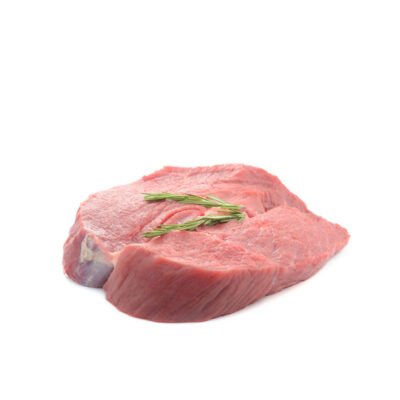
Veal is the meat of calves and is generally thought of as a healthier cut of meat than beef itself. The nutritional value of ground veal per 100g is as follows:
- Energy: 197kcal
- Protein: 18.6g
- Fats: 13.1g
- Carbs: 0g
Veal is also a good source of minerals, including iron, and has less saturated fat than beef itself. Veal is an excellent choice for the keto diet. However, as with beef, a higher number of saturated fats means you should eat veal in moderation to remain in good health while on the keto diet.
#4 Lamb
The nutritional value of ground lamb per 100g is as follows:
- Energy: 282kcal
- Protein: 16.6g
- Fats: 23.4g
- Carbs: 0g
Unlike the other meat in this list, lamb has a much higher fat content. This makes dishes containing lamb a really great source of fat on the keto diet, as well as providing high-quality protein and essential minerals like zinc, iron, and vitamin B12.
#5 Chicken (various parts)
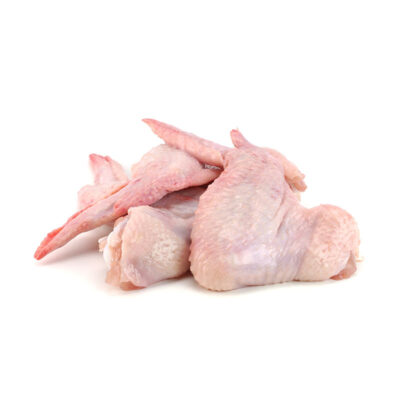
Chicken breast, wings, and legs are all great cuts for the ketogenic diet. Though chicken meat is lower in fat than other suitable keto meats, it is still a good source of protein and other essential nutrients. The nutritional value of chicken breast per 100g is as follows:
- Energy: 158kcal
- Protein: 32.1g
- Fats: 3.24g
- Carbs: 0g
Chicken tends to be a lower-fat option, and the meat is higher in monounsaturated and polyunsaturated fats than other keto meats. The protein in chicken has also been linked to greater weight loss and better overall weight management, as it boosts satiety and feelings of fullness.
There are many different cuts of chicken and ways to prepare it. The most popular ones include chicken breast, chicken legs or drumsticks, chicken wings, and chicken sausage. Ground chicken may also be used to prepare keto-friendly meatballs and burgers. Be aware that fried chicken is very high in cholesterol and saturated fats, which makes it unsuitable for the keto diet.
#6 Duck
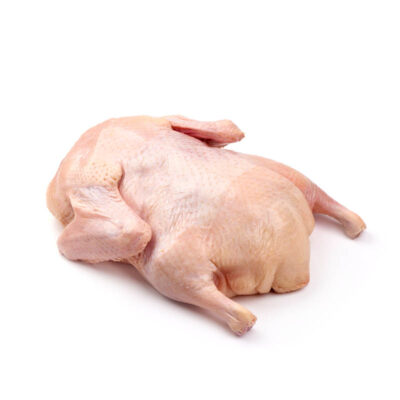
Duck is an incredibly healthy meat option that many people don’t consider on the ketogenic diet. When consumed in moderate amounts, duck can be nutritionally beneficial and perfect for the keto diet. The nutritional value of duck per 100g is as follows:
- Energy: 404kcal
- Protein: 11.5g
- Fats: 39.3g
- Carbs: 0g
As you can see, duck is slightly higher in calories than other keto meats, but it is an incredibly nutritionally dense food. It’s got a very high-fat content, which is great for the keto diet, and can be prepared in several ways.
As with many of the meats in this keto food list, duck has a negligible carb content, making it highly suitable for the keto diet. On the keto diet, you have to lower your carbohydrate intake to as little as 20g, so food without any carbs is an excellent way to nourish yourself without breaking this limit.
#7 Turkey
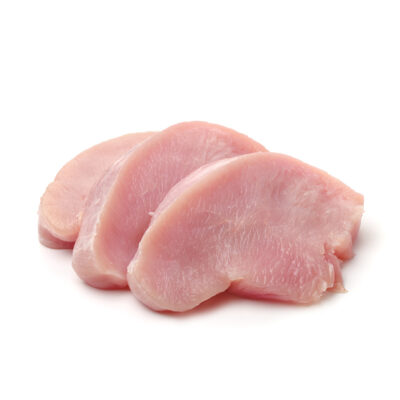
Turkey is a keto-friendly meat choice as it is high in fats and protein and very low in carbs. The nutritional value of turkey is as follows:
- Energy: 139kcal
- Protein: 28.8g
- Fats: 2.06g
- Carbs: 0g
There are many different cuts of turkey and ways to prepare it. The most popular ones include turkey breast, turkey sausage, and turkey legs. Like chicken, turkey is lower-calorie keto meat and has slightly less fat than other keto-suitable meat choices. It’s a good source of zinc, selenium, and vitamin B3.
#8 Pork belly
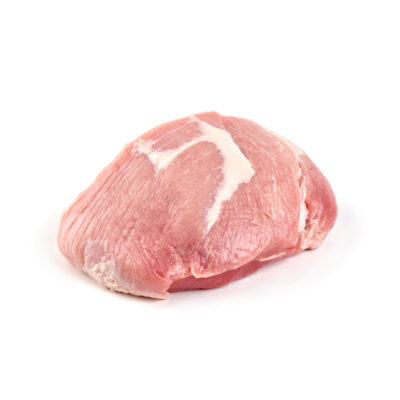
Pork belly is a good choice as long as it is eaten in moderation. It contains lots of fats, but most of this fat is saturated, making it a less healthy choice of meat for the ketogenic diet. The nutritional value of pork belly per 100g is as follows:
- Energy: 518kcal
- Protein: 9.34g
- Fats: 53g
- Carbs: 0g
Pork belly can provide you with many B-group vitamins, which are vital in energy production. This could help to combat any lethargy experienced while transitioning to the keto diet. It is also a versatile and relatively cheap cut of meat.
#9 Pork rinds
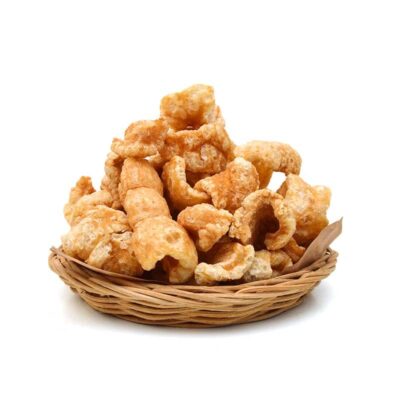
Often used as a substitute for pretzels or potato chips on the ketogenic diet, pork rinds are a zero-carb tasty snack with lots of animal fats and protein. The nutritional value of pork rinds per 100g is as follows:
- Energy: 544kcal
- Protein: 61.3g
- Fats: 31.3g
- Carbs: 0g
Pork rinds are classified as lazy keto food. Lazy keto allows dieters to eat more processed and refined foods as long as they hit their macronutrient goals.
It is best to only eat snack foods, like pork rinds, in moderation on a healthy keto diet, as they are deep-fried and may contain other unhealthy additives. When on the clean keto diet, home cooking is the best option to avoid preservatives and other additional chemicals that may be bad for your health.
#10 Sugar-free bacon
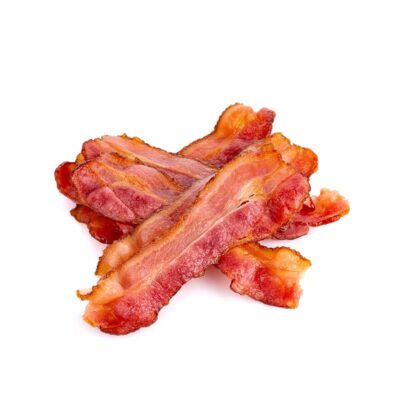
Bacon is often considered an unhealthy meat choice, but if you opt for uncured, sugar-free bacon, you can get all the protein and fat offered without the side order of added sugar, additives, sodium nitrate, and carbs. The nutritional value of sugar-free bacon per 100g is as follows:
- Energy: 545kcal
- Protein: 36.4g
- Fats: 45.4g
- Carbs: 0g
As with other processed red meats on this keto food list, even sugar-free bacon needs to be consumed in moderation on the keto diet. While it is a low-carb option for bacon, it still has a relatively high level of saturated fats, which are considered bad for your health.
#11 Plain ham
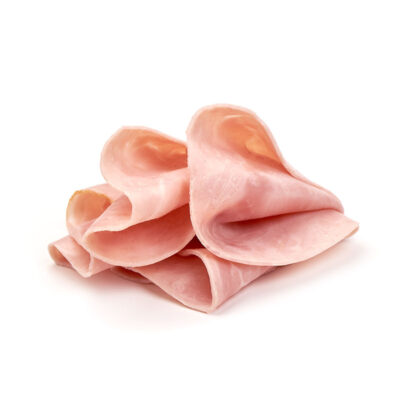
Ham can be eaten on the keto diet, but it needs to be plain to ensure it is still low in carbs. Many cured and flavored ham products have added sugar, which makes them unsuitable for keto recipes. The nutritional value of plain ham is as follows:
- Energy: 121kcal
- Protein: 19.6g
- Fats: 3.68g
- Carbs: 2.63g
Ham is also high in many minerals, including selenium, zinc, and sodium, as well as B-group vitamins. It provides all 9 amino acids, making it a good source of protein, but it is still classified as processed meat, meaning it should be consumed in moderation on the keto diet.
Ham is generally added to lists of lazy keto-friendly food choices alongside other processed meats.
#12 Sausages
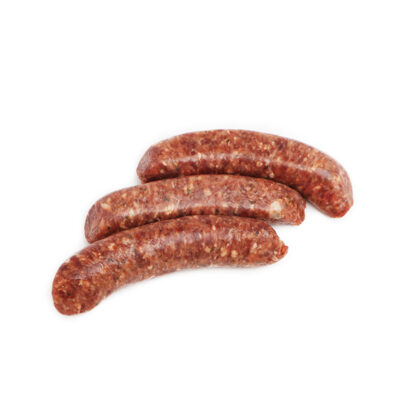
Sausages can be made of various types of meats, but the most popular choice is pork. The nutritional value of 100g of pork sausage is as follows:
- Energy: 346kcal
- Protein: 19.3g
- Fats: 28.1g
- Carbs: 2.63g
Sausage, like other processed meat, is usually found on a lazy keto diet food list. This is because they are more likely to be higher in additives and preservatives than natural cuts of meat. Sausage can be used in many keto recipes and should be eaten in moderation.
#13 Ground pork
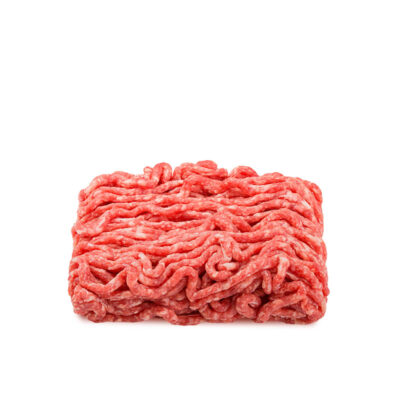
Ground pork can be used in a number of keto recipes to increase your fat intake. The nutritional value of ground pork is as follows:
- Energy: 279kcal
- Protein: 25.7g
- Fats: 20.8g
- Carbs: 0g
Consuming pork meat on the keto diet is very nourishing because of its B-group vitamin content. Indeed, pork is thought to have more B-group vitamins than other meats, like grass-fed beef and chicken.
#14 Rabbit
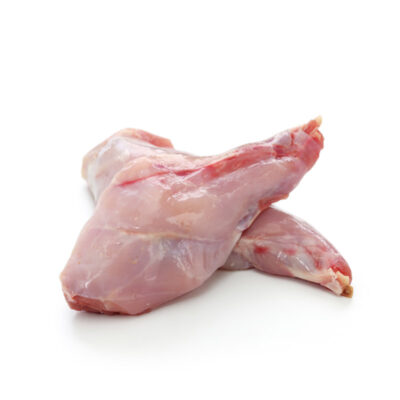
Rabbit is game meat that is suitable for the keto diet. The nutritional value of rabbit is as follows:
- Energy: 477kg
- Protein: 21.8g
- Fats: 2.32g
- Carbs: 0g
Rabbit is an excellent source of high-quality protein that provides the body with B-group vitamins, including B12 and iron.
#15 Deli meats (without additives)

Deli meats, cold cuts, or lunch meats include a variety of different meat types. They tend to be cured and precooked, making it difficult to know what is suitable for the keto diet and what isn’t. When choosing deli meat on the keto diet, we recommend checking the label for additives, added sugar, and carb content.
Some deli meat is fine to consume on the keto diet as long as it is without additives, but you should be cautious.
#16 Sugar-free jerky
There are many keto recipes online for sugar-free jerky that can be eaten as part of a keto diet. It is important not to eat too much jerky as part of your diet, but since keto jerky recipes are homemade, you can control which additives you put in. This makes sugar-free jerky a good choice.
#17 Meat sticks (without additives)
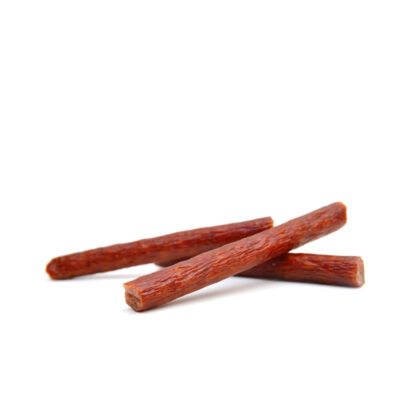
As with sugar-free jerky, meat sticks can be bought, but the store-bought kind of meat sticks are usually high in additives and other chemicals that could kick you out of ketosis and may be bad for your health.
Similarly, there are a good deal of homemade meat stick recipes online that are suitable for the keto diet that you could try. Home cooking is a great idea to ensure everything you’re eating is good for the keto diet.
#18 Liver (beef, lamb, or chicken)
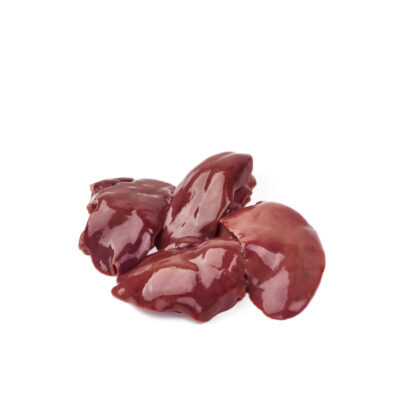
Organ meats can come from any animal, and liver meat is a popular choice. Like other organ meats, liver meat comes with a ton of health benefits, including being very high in many important vitamins and minerals.
Liver meat contains vitamins A, D, E, and K, as well as B-group vitamins. It is rich in iron, magnesium, selenium, and zinc, and it is a great source of protein. The nutritional value of chicken liver is as follows:
- Energy: 166kcal
- Protein: 24.3g
- Fats: 6.46g
- Carbs: 0.86g
#19 Beef tongue
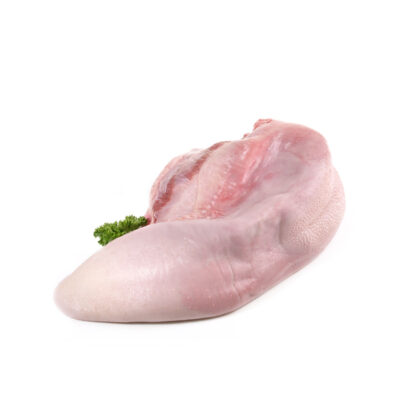
Tongue meat is another type of organ meats that could be a good choice for keto eating. The nutritional value of beef tongue is as follows:
- Energy: 224kcal
- Protein: 14.9g
- Fats: 16.1g
- Carbs: 3.68g
Beef tongue is rich in fatty acids, zinc, iron, and choline. It is often recommended to women who are pregnant, though the keto diet is not suitable for pregnant women.
#20 Kidney (beef, lamb, or chicken)
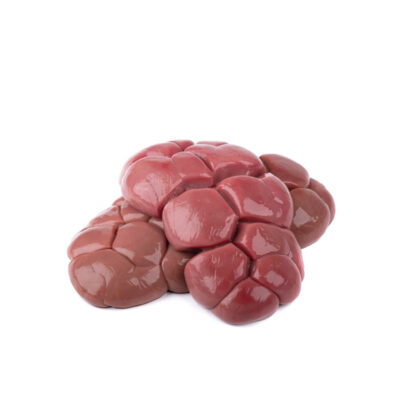
And the last of the organ meats that are great for keto is kidney meat. Kidney meat can come from many animals and has benefits, such as its omega-3 fatty acid content and anti-inflammatory effects.
The nutritional value of lamb kidney is as follows:
- Energy: 84kcal
- Protein: 15.2g
- Fats: 2.54g
- Carbs: 0.03g
FAQs
Meat is good for keto as it offers both protein and fats while having a relatively low carb content. Meat can also offer other nutrients, like B-group vitamins and iron, which are essential for the body.
On the keto diet, you need to moderate your protein intake, as too much can kick you out of ketosis. You should aim to keep your protein intake below 75g per day and, as such, cannot eat unlimited amounts of meat.
Generally, you should avoid processed meats when on the ketogenic diet. This is because they tend to have additives and other unhealthy ingredients that could be bad for your health and may even kick you out of ketosis.
A Word From Our Nutritionist
Meat is a good food choice on the ketogenic diet. It tends to be a nutrient-dense option, which can add fat, protein, and other nutrients to your diet. However, you will need to limit your meat intake to ensure you do not go over the 75g daily protein limit.
Meat provides many fats on keto; however, it is also a source of lots of saturated and unhealthy fat. As such, you should supplement your diet with healthier fats, which can be found in fatty fish, olive oil, and avocado oil. These are all good sources of monounsaturated fat, which is good for the heart.
Additionally, you could add coconut oil to your diet as it contains MCT oil, which is well known for its benefits to those eating the keto way.
When choosing meat on the keto diet, it is best to choose organic and grass-fed meats that are unprocessed to avoid any harmful additives. You should also pair your meat with keto vegetables, like leafy greens and bell peppers, to ensure you’re getting other vital nutrients, like vitamin C and fiber.
Conclusion
Many meat choices are good for the keto diet. They provide fat and protein but should be eaten in moderation to avoid breaking the 75g daily protein limit. If you want to avoid any additives or residual chemicals that could harm your health on the keto diet, choose organic and grass-fed meat.

















































 Select your language:
Select your language: 





